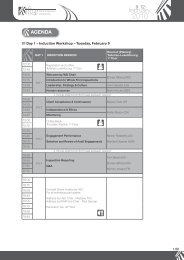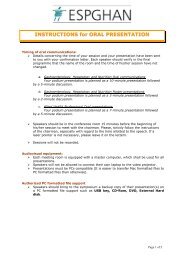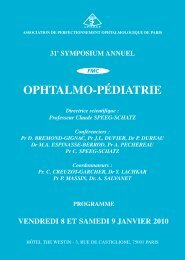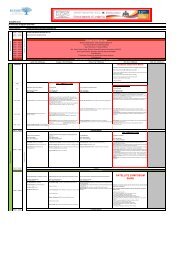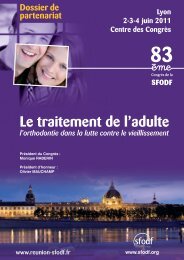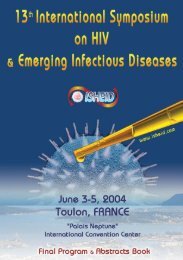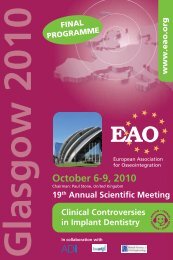- Page 2 and 3:
EDITORIAL Dear Madam, Dear Sir, It
- Page 4 and 5:
PRACTICAL INFORMATION - INFORMATION
- Page 6 and 7:
PROGRAM AT A GLANCE “ Focusing FI
- Page 8 and 9:
WEDNESDAY JUNE 21, 2006 - MERCREDI
- Page 10 and 11:
WEDNESDAY JUNE 21, 2006 - MERCREDI
- Page 12 and 13:
THURSDAY JUNE 22, 2006 - JEUDI 22 J
- Page 14 and 15:
THURSDAY JUNE 22, 2006 - JEUDI 22 J
- Page 16 and 17:
FRIDAY JUNE 23, 2006 - VENDREDI 23
- Page 18 and 19:
POSTERS PRESENTATIONS - PRESENTATIO
- Page 20 and 21:
POSTERS PRESENTATIONS - PRESENTATIO
- Page 22 and 23:
POSTERS PRESENTATIONS - PRESENTATIO
- Page 24 and 25:
POSTERS PRESENTATIONS - PRESENTATIO
- Page 26 and 27:
POSTERS PRESENTATIONS - PRESENTATIO
- Page 28 and 29:
POSTERS PRESENTATIONS - PRESENTATIO
- Page 30 and 31:
POSTERS PRESENTATIONS - PRESENTATIO
- Page 32 and 33:
The hospital reform in progress may
- Page 34 and 35:
OP 1.3 Public Health and Social Sci
- Page 36 and 37:
OP 2.1 Research Priorities in HIV :
- Page 38 and 39:
OP 2.3 Research Priorities In HIV I
- Page 40 and 41:
OP 3.2 Interactions between HSV and
- Page 42 and 43:
OP 3.4 Fertility options in HIV-inf
- Page 44 and 45:
OP 3.5 Non-AIDS defining cancers in
- Page 46 and 47:
OP 4.3 Update on TMC114 - Actualit
- Page 48 and 49:
OP 4.5 Recent data on PA-457 Matura
- Page 50 and 51:
OP 5.3 Immunology - Summary of adva
- Page 52 and 53:
OP 6.2 Molecular Epidemiology of HI
- Page 54 and 55:
In 1995 HIV started to spread rapid
- Page 56 and 57:
Given the high HIV prevalence in ID
- Page 58 and 59:
OP 6.4 The Epidemiology of HIV & ST
- Page 60 and 61:
OP 7.3.1 We must switch early patie
- Page 62 and 63:
OP 7.4.2 Entry inhibitors have to b
- Page 64 and 65:
OP 8.2 West Nile Virus Infection in
- Page 66 and 67:
First, the origin of primary introd
- Page 68 and 69:
To reduce the amount of virus that
- Page 70 and 71:
OP 9.1 New Developments in the Trea
- Page 72 and 73:
OP 9.3 Future options in non respon
- Page 74 and 75:
the consensus interferon dose (25,2
- Page 76 and 77:
interferon maintenance therapy in d
- Page 78 and 79:
26) Kaiser S, Hass HG, Gregor M. Su
- Page 80 and 81:
OP 10.1 Progress in Microbicide Dev
- Page 82 and 83:
OP 10.3 Current Advances in HIV Vac
- Page 84 and 85:
dysmetabolic, functional, or organi
- Page 86 and 87:
Orphans Forty-three percent of the
- Page 88 and 89:
PP 1.4 Pradip Timilsena, Laxmi Pras
- Page 90 and 91:
PP 1.6 Epidemiological aspects of M
- Page 92 and 93:
PP 1.8 HIV transmission in The Gamb
- Page 94 and 95:
PP 1.10 Evaluation of Prevalence an
- Page 96 and 97:
PP 1.12 Co-morbidity of HIV, Hepati
- Page 98 and 99:
PP 1.14 Screening for HIV-infection
- Page 100 and 101:
PP 1.16 Low performance of HIV-1 se
- Page 102 and 103:
PP 1.18 The spread of HIV-1 resista
- Page 104 and 105:
PP 1.20 Study of the anti-HIV recom
- Page 106 and 107:
PP 1.22 Comparative investigation o
- Page 108 and 109:
PP 1.24 Foreign Citizens Admitted t
- Page 110 and 111:
PP 1.26 Morbidity pattern of PLWA r
- Page 112 and 113:
PP 1.28 Incidence of Atypical Mycob
- Page 114 and 115:
PP 1.29 Developing Partnerships Bet
- Page 116 and 117:
PP 1.31 Pakistani Youth and their R
- Page 118 and 119:
PP 1.33 Model based on a quantum al
- Page 120 and 121:
PP 2.2 Analysis of Full-length HIV-
- Page 122 and 123:
PP 2.4 The Cobas Ampliprep/Cobas Ta
- Page 124 and 125:
PP 2.6 Mutations and Polymorphisms
- Page 126 and 127:
PP 2.8 Differences in the phenotypi
- Page 128 and 129:
PP 2.10 Biochemical Characterizatio
- Page 130 and 131:
Upon 60 minutes contact of BVDV spi
- Page 132 and 133:
PP 2.13 Assessing the Contribution
- Page 134 and 135:
PP 2.15 Correlation between circula
- Page 136 and 137:
PP 2.17 Interface targeting peptide
- Page 138 and 139:
PP 2.19 HIV-1 gene expression: less
- Page 140 and 141:
PP 2.21 Vesical Cancer and Papillom
- Page 142 and 143:
PP 3.2 Is Age a Complicating Factor
- Page 144 and 145:
PP 3.4 Reversible HIV associated en
- Page 146 and 147:
PP 3.6 Mycobacterium Ulcerans Cutan
- Page 148 and 149:
PP 3.8 A Clinical Study Of 60 Patie
- Page 150 and 151:
PP 3.9 HIV and Tuberculosis: Partne
- Page 152 and 153:
PP 3.11 Clinicopathological compari
- Page 154 and 155:
PP 3.13 Crohn's disease onset in a
- Page 156 and 157:
PP 3.15 Ocular manifestations occur
- Page 158 and 159:
PP 3.17 Bladder carcinoma observed
- Page 160 and 161:
PP 3.19 Increasing concerns related
- Page 162 and 163:
PP 3.21 Glucose intolerance and ins
- Page 164 and 165:
PP 3.23 Proviral DNA and plasma vir
- Page 166 and 167:
PP 3.25 Frequency, monitoring, clin
- Page 168 and 169:
PP 3.27 HIV-positive cases as part
- Page 170 and 171:
PP 3.29 The Effects of a Supervised
- Page 172 and 173:
PP 3.31 Prevalence of depression am
- Page 174 and 175:
PP 3.33 Rhinopharyngeal carcinoma w
- Page 176 and 177:
PP 3.35 Large vessel damage due to
- Page 178 and 179:
PP 3.37 No Interference between Syp
- Page 180 and 181:
PP 3.39 Faecal flora, diarrhoea ass
- Page 182 and 183:
PP 4.2 Triple therapy adherence in
- Page 184 and 185:
In a hierarchical multiple regressi
- Page 186 and 187:
PP 4.5 A Prospective Study of Antir
- Page 188 and 189:
PP 4.7 Telephone-Based Coping Impro
- Page 190 and 191:
PP 4.9 The significantly different
- Page 192 and 193:
PP 4.11 Self-Evaluation Investigati
- Page 194 and 195:
PP 4.13 Treatment of Kaposi's sarco
- Page 196 and 197:
PP 4.15 Pharmacokinetic Interaction
- Page 198 and 199:
PP 4.17 Human immunodeficiency viru
- Page 200 and 201:
PP 4.19 Much More Sure than 2 Years
- Page 202 and 203:
PP 4.21 No evidence of reduced viro
- Page 204 and 205:
PP 4.23 The increased liver toxicit
- Page 206 and 207:
PP 4.25 Rapid Oral Desensitization
- Page 208 and 209:
PP 5.1 Rational design of HCV antig
- Page 210 and 211:
PP 5.3 Immune restoration levels un
- Page 212 and 213:
PP 5.5 Fulminant Candida albicans p
- Page 214 and 215:
PP 5.7 Chronic hepatitic C-prompted
- Page 216 and 217: PP 5.9 Chronic HBV infection associ
- Page 218 and 219: PP 6.2 Broadly protective immunity
- Page 220 and 221: PP 6.4 Chikungunya arthritis sequel
- Page 222 and 223: PP 6.5 Experimental determination o
- Page 224 and 225: PP 6.7 Emerging Arboviruses in Turi
- Page 226 and 227: PP 6.9 Ocular LOA-LOA Infection in
- Page 228 and 229: PP 6.11 Prevalence of Carriers of M
- Page 230 and 231: PP 6.13 Evaluation of the Prevalenc
- Page 232 and 233: PP 6.15 Assessment of need of Patie
- Page 234 and 235: PP 6.17 Community-acquired septicem
- Page 236 and 237: PP 6.19 Multiple sclerosis managed
- Page 238 and 239: PP 6.21 A serious staphylococcal kn
- Page 240 and 241: PP 6.23 Comparison between Secretor
- Page 242 and 243: PP 6.25 Real- Time PCR and Flow Cyt
- Page 244 and 245: FP 0.2 Preclinical Development of a
- Page 246 and 247: FP 0.4 Primary Resistance of a Nove
- Page 248 and 249: FP 1.1 In Vivo Emergence of RANTES-
- Page 250 and 251: Conclusion:Patients with HIV-1 infe
- Page 252 and 253: FP 1.4 V1V2 loop length variation d
- Page 254 and 255: FP 1.6 Analysis of plasma cytokines
- Page 256 and 257: FP 1.8 Detection of low frequency H
- Page 258 and 259: FP 1.10 Replication-Competent Platf
- Page 260 and 261: FP 2.1 Long-term non-progression in
- Page 262 and 263: FP 2.3 HAART in Sub-Saharan countri
- Page 264 and 265: FP 2.5 Morbidity and mortality by b
- Page 268 and 269: FP 2.8 Radata - An internet-based s
- Page 270 and 271: FP 3.2 Glycosylated recombinant sim
- Page 272 and 273: FP 3.4 Therapeutic Tat-Vaccination
- Page 274 and 275: PL 2 HIV & AIDS Research: The Light
- Page 276 and 277: SS 1.1 The importance of HIV drug r
- Page 278 and 279: SS 1.3 Virtual phenotype and Clinic
- Page 280 and 281: SS 2.1 The Lessons we have Learned
- Page 282 and 283: SS 5.2 HIV-associated facial lipoat
- Page 284 and 285: SS 6.1 How to improve the use of ne
- Page 286 and 287: SS 6.3 Tipranavir is a Potent Prote
- Page 288 and 289: ABBOTT FRANCE Abbott is a global, b
- Page 290 and 291: BOEHRINGER INGELHEIM The Boehringer
- Page 292 and 293: IVAGEN IVAGEN SA, a biotechnology c
- Page 294 and 295: ROCHE Headquartered in Basel, Switz
- Page 296 and 297: Putting knowledge into practice VIR
- Page 298: NOTES “ Focusing FIRST on PEOPLE




